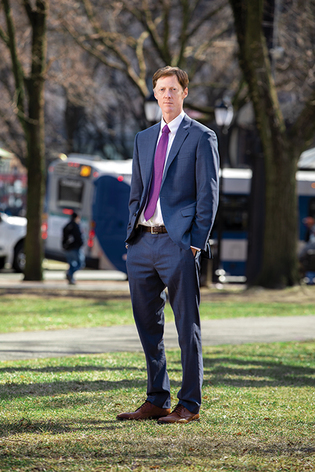
Bob Handelman
Business and environment, New Haven and Yale: Mayor Justin Elicker ’10MBA, ’10MEM, spans them all. He’s pictured here on the Green—the city’s meeting point for town and gown.
Elicker spoke with James Ledbetter ’86, chief content officer for Clarim Media. The interview has been condensed and edited for clarity.
View full image
Many people who arrive at Yale fall in love with New Haven, but very few become its mayor. After receiving his undergraduate degree at Middlebury College, Justin Elicker ’10MBA, ’10MEM, enrolled in the Yale School of Forestry and Environmental Studies—now renamed the Yale School of the Environment. And a political career soon followed.
James Ledbetter: How did you end up becoming the mayor of New Haven?
Justin Elicker: I was looking at a number of different universities, to get a graduate degree in business and environment, and wanted to come to New Haven and Yale—over a couple of other choices—because I grew up in New Canaan and felt like this is a place where I could be close to my family and put down roots.
JL: You ran for alder when you were a grad student. That’s a heavy load.
JE: I was not a very good student, because I was focused on doing a lot in the community, but there was a lot of benefit to me being alder and student at the same time. I could use the things that I was learning in class and apply them to local government.
JL: I don’t think most people associate New Haven with forests. How does that bear on what you do day to day?
JE: I focused primarily on environmental policy. That’s been very helpful in allowing me to see a bigger picture of how to improve the environment and the issues around equity that are closely intertwined with that challenge. We’re talking a lot about affordable housing in New Haven now. One way we can improve access to affordable housing is to increase density, and increased density also helps reduce the impact on climate change. Having more people living in cities can allow them to opt out of owning a car and to use more public transportation, and more bicycles.
JL: Before you became mayor, you worked in the State Department, based in Hong Kong and Taiwan. I’m curious about those experiences and what you took away from that.
JE: That experience was incredible. I learned a lot about working with all different types of people, and seeing the United States from the lens of outside the United States gives more perspective on things that I took for granted. And it allowed me to learn Chinese, which occasionally comes in handy in New Haven.
JL: What has New Haven’s experience of COVID been?
JE: What has been very positive is that we’ve seen the community respond in a way that underscores the importance of science and is guided by decisions based on evidence. The overwhelming majority of New Haven residents are wearing masks, social distancing, taking the guidance that we’ve been giving from early on and putting it into action. We have worked hard to ensure that historically underserved communities have access to the resources needed on the health side—in particular with testing, but also for basic needs: we’ve spent a lot of time ensuring that people have access to food, and we have rehoused over 300 individuals experiencing homelessness in the pandemic.
JL: How would you characterize the current relationship between New Haven and Yale?
JE: The conversations that we’re having nationally about systemic racism and how we all can do our part to address these challenges, I think, are intimately related to the historical relationship between the university and the city. Yale has incredible wealth, at a time when cities like New Haven are being crushed by a pandemic and the economic impacts that come with it. We’re having conversations with the university, and I am hopeful. I think it will take a lot of strong leadership to ensure that the university understands what should be a long-term commitment to the city.
JL: Since you first moved to New Haven, what has changed for the better the most?
JE: The city itself is growing. I think there’s a benefit to that: a lot of construction, a lot of new buildings. A lot of that growth hasn’t necessarily impacted populations that are struggling. The key is to make sure we’re creating the infrastructure to allow not just growth, but inclusive growth.
 loading
loading